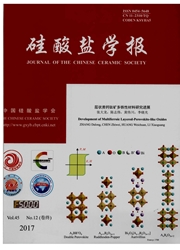

 中文摘要:
中文摘要:
近年来,以胶体纳米晶半导体材料作为构建部分的第三代太阳能电池(又称为量子点太阳能电池)一直是研究的热门课题。胶体量子点在太阳能电池中应用之所以备受关注,是由于其具有类似溶液的可操作性,这无疑将极大地方便其整合到各种结构类型太阳能电池器件中。与传统硅基太阳能电池相比,量子点太阳能电池的制造成本可大幅度降低,重点介绍了几种不同结构类型的全无机量子点太阳能电池及其工作原理,讨论了各种结构类型电池的优点以及不足之处,并展望了今后该领域的发展方向。
 英文摘要:
英文摘要:
In recent years, inorganic semiconductor nanocrystals solar cells (also known as colloidal quantum dots solar cells) have been an interesting subject for extensive researches. The aspect of colloidal quantum dots has received much attention in photovoltaic field due to their solution processability, which is rather convenient for their integration into different types of the solar cells. Therefore, the application of colloidal quantum dots in solar cells will bring the sharp reduction of the fabrication-cost, compared to the conventional silicon-based solar cells. This review represented the most common types of all-inorganic solar cells by employing colloidal quantum dots and their working principles. In addition, the advantages and disadvantages of the different device architectures and their future directions were also discussed.
 同期刊论文项目
同期刊论文项目
 同项目期刊论文
同项目期刊论文
 Tuning the Relative Concentration Ratio of Bulk Defects to Surface Defects in TiO2 Nanocrystals Lead
Tuning the Relative Concentration Ratio of Bulk Defects to Surface Defects in TiO2 Nanocrystals Lead P-type transparent conducting SnO2:Zn film derived from thermal diffusion of Zn/SnO2/Zn multilayer t
P-type transparent conducting SnO2:Zn film derived from thermal diffusion of Zn/SnO2/Zn multilayer t Effects of annealing temperature on structure and opt-electric properties of ion-conducting LLTO thi
Effects of annealing temperature on structure and opt-electric properties of ion-conducting LLTO thi Formation of AgI/TiO(2) nanocomposite leads to excellent thermochromic reversibility and photostabil
Formation of AgI/TiO(2) nanocomposite leads to excellent thermochromic reversibility and photostabil Ultralow density, hollow silica foams produced through interfacial reaction and their exceptional pr
Ultralow density, hollow silica foams produced through interfacial reaction and their exceptional pr Effect of heat-treatment on crystalline phase and UV absorption of 60CeO(2)-40TiO(2) thin films by m
Effect of heat-treatment on crystalline phase and UV absorption of 60CeO(2)-40TiO(2) thin films by m Crystallization Kinetics of Superionic Conductive Al(B, La)- Incorporated LiTi2(PO4)(3) Glass-Cerami
Crystallization Kinetics of Superionic Conductive Al(B, La)- Incorporated LiTi2(PO4)(3) Glass-Cerami Effects of addition of tungsten chloride on optical properties of VO2-based thermochromic films prep
Effects of addition of tungsten chloride on optical properties of VO2-based thermochromic films prep The effect of tin on sulfur K-edge X-ray absorption near edge structure spectra of soda–lime–silicat
The effect of tin on sulfur K-edge X-ray absorption near edge structure spectra of soda–lime–silicat Growth of free-standing TiO(2) nanorod arrays and its application in CdS quantum dots-sensitized sol
Growth of free-standing TiO(2) nanorod arrays and its application in CdS quantum dots-sensitized sol 期刊信息
期刊信息
